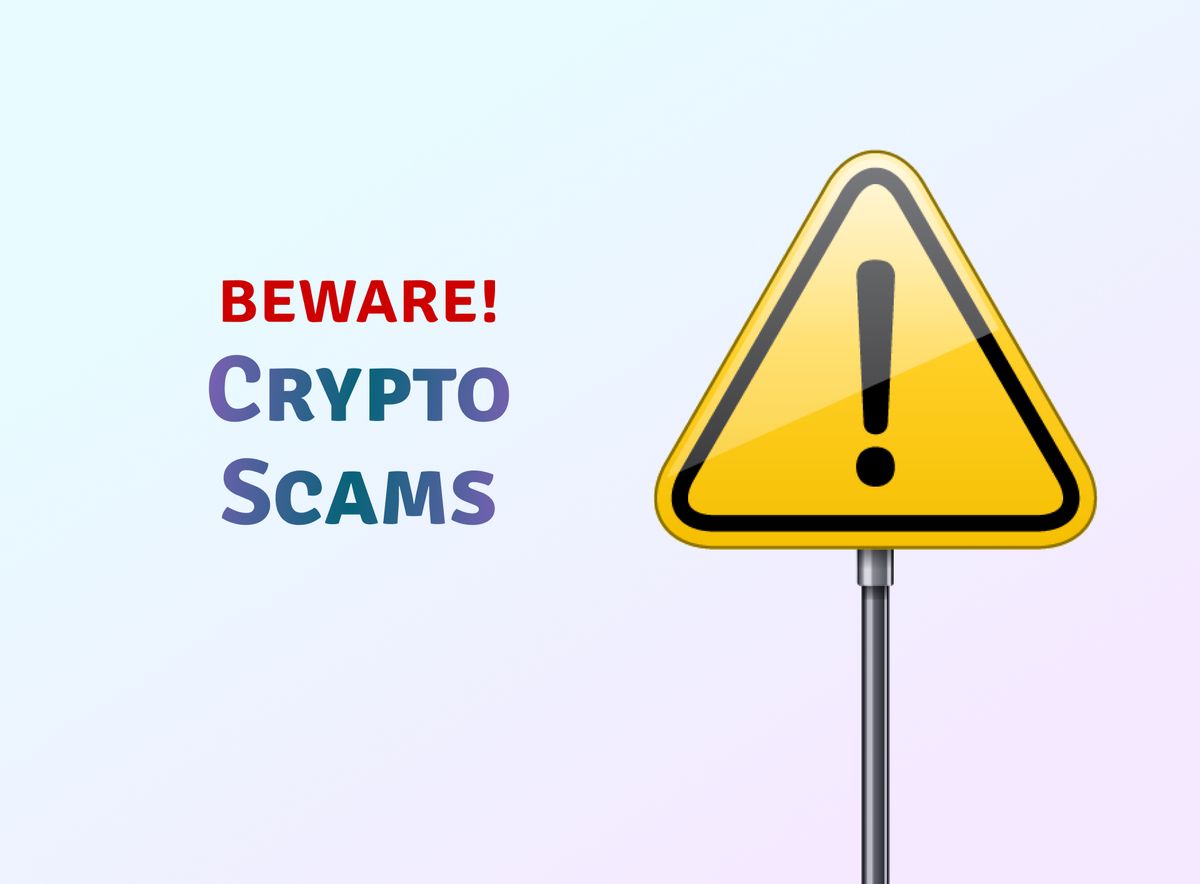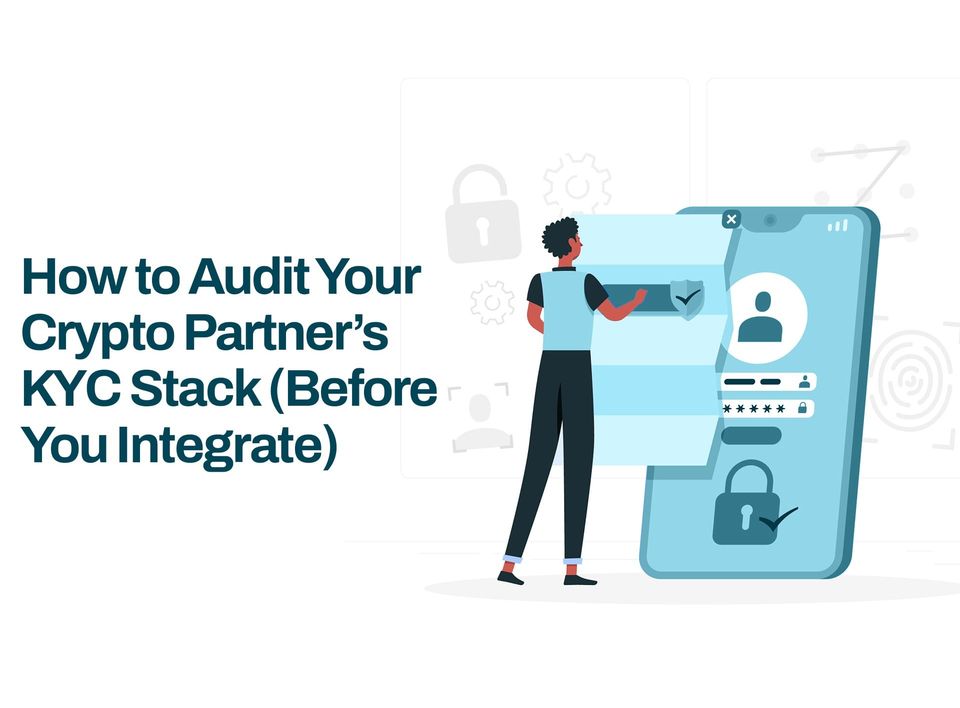What You Need To Know About Cryptocurrency Scams
To avoid crypto scams, you need to understand how each one operates. So, let's take a look at some types of crypto scams.

TABLE OF CONTENTS:
- Introduction
- Types of Crypto Scams
- How to Avoid Crypto Scams
- What To Do If You Fall Victim to a Scam
- Takeaway
- FAQs
Introduction
The rise of cryptocurrency over the years has given birth to lots of new ways to trade and generally carry out transactions. However, in the same way this new digital asset has attracted investors, scammers have tapped into the crypto community.
It is particularly necessary to know how to avoid cryptocurrency scams because crypto transactions are essentially irreversible. Once you send out a payment to a third party, it cannot be stopped or reversed. This means you must always be certain of the legitimacy and trustworthiness of whatever blockchain address you are sending Bitcoin, Ethereum, WKD Inu, Solana, or any other coin/token to. In addition, always use only third-party merchants and services you trust.
That being said, let’s get into the different types of cryptocurrency scams to avoid.
Types of Crypto Scams
To avoid crypto scams, you need to understand how each one operates. So, let's take a look at some types of crypto scams.
Giveaway Scams:
Scammers often pretend to be influential business people, cryptocurrency influencers, or popular celebrities who have coins or tokens to give away. In a bid to make their offer seem authentic, the messages and posts sent out by these scammers on Twitter, Instagram, or Facebook appear "well written" and sent from a “real” account.
To grab the attention of potential victims, a scammer may send a message or make a social media post offering to multiply or match whatever amount of cryptocurrency is sent to them. The offer will appear to be “too good to be true” and a “once-in-a-lifetime” opportunity so as to manipulate you into sending funds to their wallet. They might even go as far as replying to posts with other fake accounts to give more credibility to the scam.
Typically, crypto scam messages and fraudulent posts include screenshots as proof of validity and a QR code or link to a website where you will need to “verify” your wallet address by making a payment.
If you receive such messages or come across such posts on Twitter, Facebook, Instagram, Telegram, or any other social platform, ignore them and report the account. Legitimate companies or merchants will never request your login details or payments to participate in a giveaway.
Remember, if it seems too good to be true, it is most likely fake.
Imposter Websites:
There are numerous websites on the internet that have been created by malicious parties to resemble legitimate company websites. These sites are basically clones that steal your confidential information to hack into your crypto wallet and steal your assets. This is known as phishing and is one of the most common scams people fall for not just in the crypto community, but generally when it comes to online transactions.
Operators of these fraudulent sites distribute their website links through various channels including social media, search engine ads, emails, and SMS messages,
A fake website usually will not have a tiny lock icon near the URL bar and no “https” that indicates the site is safe to visit and use. They also tend to change the letters of the fake site URL to something similar to that of the authentic site; like changing “i” to “1” or “o” to “0”. For instance, a scammer could set up an 0biex.finance or 0b1ex.finance site knowing the URL is identical to the original Obiex site.
To avoid falling prey to crypto phishing scams, always double-check whatever URL you type into your browser and do not tap on links that come from places, people, or accounts you don’t trust.
Extortion Scams:
Scammers frequently use information obtained from website data breaches to trick their targets into believing they possess potentially harmful information about them. For instance, they could send a blackmail email claiming to expose your browser history of visits to illicit sites if you don’t send them a particular amount of Bitcoin or share your wallet's private keys. This is criminal extortion and you should immediately report the email as spam and run a malware scan on your device just to be on the safe side.
Investment Scams:
A crypto investment scam will encourage you to invest money to gain (unbelievably) higher returns with little to no financial risk. Then you will be asked to recruit more people to invest as well. Essentially, it is run like a Ponzi scheme for cryptocurrency.
To avoid falling for these crypto scams, do a thorough investigation into any company that offers you any investment opportunities. Be cautious about any services or sites promising unrealistically high returns. Look for publicly verifiable reviews and authentic articles about the company or third party. Keep an eye out for grammatical mistakes on the company website or in any emails sent out by them as scammers tend to make lots of grammar errors.
Fake Apps:
There are quite a high number of fake crypto apps on Google Play and Apple App Store. Although they are often found and removed immediately, they are still a considerable fraud risk to be aware of.
Before you download any crypto app, check the name, the description, and even the logo. If anything looks off, do not download it to your device. Check the app name online for any reviews and possible indications of fraud or scam alerts.
How to Avoid Crypto Scams
Here are a few ways to avoid cryptocurrency scams:
· Enable two-factor authentication on your crypto wallet and social media accounts as well.
· Always thoroughly research any cryptocurrency investment, app, or giveaway that you come across.
· Never give out your crypto wallet login details or private key to anyone. If possible, store the information offline.
· Double-check all website links before clicking on them to avoid falling victim to phishing scams.
· Never accept any offer that requests for a fee to be paid in cryptocurrency before granting you access to a giveaway or investment opportunity.
What to Do If You Fall Victim to a Scam
Falling victim to a cryptocurrency scam can be distressing, but knowing the right steps to take can help you reduce the damage and increase your chances of recovering lost funds. Here’s a step-by-step guide on what to do if you find yourself scammed:
1. Stop All Transactions Immediately:
If you realise you’ve been scammed, the first thing you need to do is cease all transactions. Do not send any more money or personal information. Scammers often try to exploit the urgency and fear of their victims, so stopping further interaction is important to prevent additional losses.
2. Report the Scam to Authorities:
Contact your local law enforcement agency to report the scam. Many countries have dedicated units for handling cybercrime and financial fraud. In the United States, you can report to the Federal Trade Commission (FTC) or the Internet Crime Complaint Center (IC3). Providing detailed information about the scam can help authorities track down the perpetrators and possibly recover your funds.
3. Notify Your Financial Institutions:
Inform your bank and any other financial institutions involved in the transactions. They may be able to stop further withdrawals or charges. If your bank accounts or credit cards are compromised, they can assist in securing your accounts and issuing new cards.
4. Report the Scam to the Cryptocurrency Exchange:
If the scam involved a cryptocurrency exchange, report the incident to them immediately. Exchanges often have procedures in place to handle such situations and may freeze the scammer’s account, preventing them from moving the stolen funds further.
5. Document All Details:
Gather and document all information related to the scam. This includes emails, messages, transaction IDs, and any other relevant details. Having a clear record of the scam can help law enforcement and financial institutions in their investigations.
6. Change Your Passwords and Enable Two-Factor Authentication:
Change the passwords for all your online accounts, especially those related to your finances and personal information. Enable two-factor authentication (2FA) wherever possible to add an extra layer of security. This can prevent scammers from accessing your accounts in the future.
7. Monitor Your Accounts:
Keep a close eye on your bank accounts, credit reports, and cryptocurrency wallets. Look out for any suspicious activity and report it immediately. Continuous monitoring can help you quickly react to unauthorised transactions.
8. Educate Yourself and Stay Informed:
Learn more about common scams and how to avoid them. Stay updated on the latest security practices and be cautious when dealing with unfamiliar parties online. Being informed can significantly reduce your risk of falling victim to future scams.
9. Seek Professional Help if Needed:
Consider consulting a professional for further assistance. Lawyers specialising in cybercrime, financial advisors, or cybersecurity experts can provide guidance on additional steps to take and how to protect yourself in the future.
10. Support Networks and Counseling:
Being scammed can be emotionally draining. Don’t hesitate to seek support from friends, family, or professional counselors. Sharing your experience and getting emotional support can help you cope with the stress and anxiety caused by the scam.
Takeaway
The rise in cryptocurrency's popularity has unfortunately attracted scammers who exploit the lack of knowledge many people have about this technology. Education is your best defense against these scams. By staying informed and cautious, you can safely navigate the crypto world and avoid becoming a victim of fraud.
Remember, if something feels off or confusing, take the time to research and ask questions before making any decisions. Your diligence can save you from potential losses and ensure a safer crypto experience.
FAQs
Q1. What is a cryptocurrency scam?
A1. A cryptocurrency scam is a fraudulent activity where scammers trick people into giving away their money or personal information using cryptocurrencies like Bitcoin or Ethereum.
Q2. How common are cryptocurrency scams?
A2. Cryptocurrency scams are increasingly common. In 2022, the Federal Trade Commission (FTC) reported that crypto scams resulted in losses of over $1 billion in the United States alone. This number has been rising as more people invest in cryptocurrencies.
Q3. What are the most common types of cryptocurrency scams?
A3. Common cryptocurrency scams include phishing, fake exchanges, Ponzi schemes, and investment scams. Phishing involves fake websites or emails to steal personal info. Fake exchanges look like legitimate trading platforms. Ponzi schemes promise high returns with little risk, using new investors' funds to pay earlier investors.
Q4. How can I spot a cryptocurrency scam?
A4. Be wary of offers that sound too good to be true, such as guaranteed high returns with no risk. Look for poor website design, fake testimonials, and pressure to act quickly. Always verify the credibility of the exchange or investment platform through multiple sources.
Q5. What should I do if I think I am being scammed?
A5. Stop all communication with the scammer immediately. Do not send any money or personal information. Report the scam to relevant authorities, such as the FTC or your local consumer protection office. Also, inform your bank or financial institution.
Q6. Can cryptocurrency transactions be reversed if I get scammed?
A6. No, cryptocurrency transactions are generally irreversible. Once you send crypto to another wallet, it’s nearly impossible to get it back.
Q7. Are there any safe ways to invest in cryptocurrency?
A7. Yes, there are safe ways to invest in cryptocurrency. Use well-known and reputable exchanges, enable two-factor authentication, and store your cryptocurrency in secure wallets.
Q8. How can I secure my cryptocurrency assets?
A8. To secure your cryptocurrency, use strong, unique passwords for your accounts, enable two-factor authentication, and use hardware wallets for storage. Avoid sharing your private keys and be cautious about where you store them.
Q9. Is it safe to invest in new cryptocurrencies or Initial Coin Offerings (ICOs)?
A9. Investing in new cryptocurrencies or ICOs can be very risky. Many ICOs turn out to be scams. Research the team behind the project, read their whitepaper, and look for reviews and community discussions.
Q10. Where can I learn more about protecting myself from cryptocurrency scams?
A10. You can learn more from reputable sources such as the FTC, the Securities and Exchange Commission (SEC), and trusted financial websites. The Obiex blog also offers educational resources on how to protect your assets and recognise scams.
Disclaimer: This article was written by the writer to provide guidance and understanding of cryptocurrency trading. It is not an exhaustive article and should not be taken as financial advice. Obiex will not be held liable for your investment decisions.




